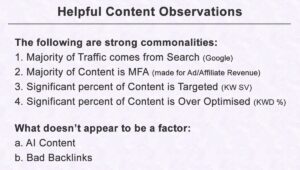As to be expected – Google aren’t going to tell us what the algo is looking at.
But I firmly believe the label for the HCU is a misdirection, says Lindon NA.
It’s not if the content is helpful, I think it’s if it’s SE first.
If you look through the doc from the 2022 release (August), the wording makes it quite clear that Google’s focusing on content that appears to be Not people first.
Initially – I was thinking that it would be User Satisfaction signals (bounce back to SERP, alternative clicks etc.).
Yet some of the sites hit seem to have acceptable figures (I’ve seen far worse).
But I did notice that almost all of them … were “SEO’d”.
They were clearly targeting specific types of queries, (review types – individual items, best of’s etc., and simplistic guides types – 10 things to do in X etc.).
And many seemed to follow a pattern of term targeting (4%+ in the top few paragraphs etc.)
And of course, the nature of the site; I think every single one is basically MFA (Made for Ad/Affil. rev).
Add to that they all seem to be reliant upon Search Engine Traffic (70%+ of all traffic seems to come from Google alone)
I’ve seen people suggest (or blatantly claim!) that it could be down to backlinks … but some of the sites are fairly clean.
Others have pushed AI content – but many have a huge backlog of human made content, and not employed AI.
So I strongly doubt it.
So – where does that leave us?
Well, earlier, I made the suggestion of shifting to Ecommerce.
Not as a way to “step around” Google apparently hitting MFAs, but because the structure/organisation is different, and you end up producing different content.
And I stand by that!
It really looks like Google opted to filter through the SERP:
- looking for sites that are heavily dependent on SE traffic
- that have a limited range of content formats/intent types
- the seem to be “optimised” for specific query types/volumes
As it seems to be ratio based, the quantity of content types needs to be addressed.
a) Remove the majority of SE targeted pages or b) Introduce a significant quantity of new content that isn’t SE focused or c) Do a mix of (a) & (b) and reduce the “optimisation” levels.
Personally – I’d also consider reducing the degree of monetisation some sites have (as a consumer, hitting an ad every 200 words/view port – sucks ass!!!)
Further – affiliate/referral earnings should be declared up front! (don’t put it in small text at the end!)
And yes – I know – Forbes et-al do X, Y and Z shit.
Sadly, they tend to be teflon.
I know – it’s unfair, it’s unjust, it sucks ass.
But that’s Google for you.
Forget them – focus on your site.
And your site – should focus on People/Users, not Bots and Algorithms (Yes – there’s irony in me suggesting ways to pass an algo, telling you to not focus on algo’s ).
So – have a look at your site.
Think of “the funnel” and “the user journey”.
Think of the different content formats/types that apply for each.
What don’t you have?
What content did you not bother producing, because you wouldn’t earn a lot from it, but people would use/benefit from?
What formats that would come before/after your “review of’s” and “best of’s” etc.?
And, don’t forget – it has to be valuable to users!
I’m not saying create content for the sake of content, or just to “balance out” your MFA stuff.
I’m telling you that there’s a whole bunch of different types of content that you could produce, that you may not earn from, but that users want/need.
Find it, produce it.
And yes – shift gears so you aren’t so reliant on Google!
Social. Communities. Gated content. Email subscriptions.
(you can monetise the latter 2)
And that’s as well as looking at ranking in other SE’s (much less traffic, but means you won’t bleed as much!)
